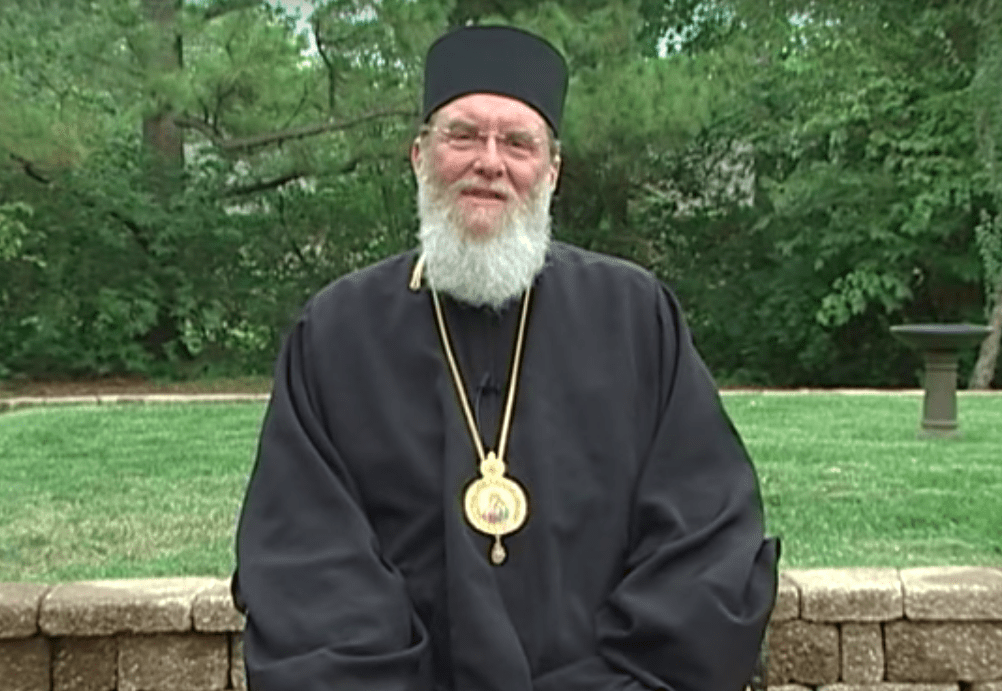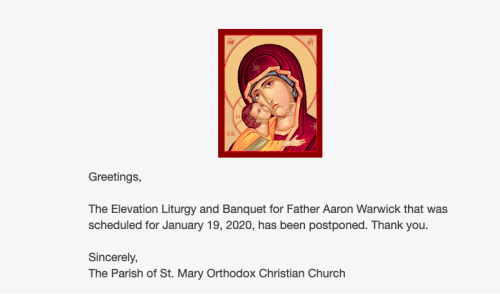When A Bishop Does Right

Whenever you read about bishops here, it’s usually to complain about their failings. I’m delighted to be able to write about something good a bishop has done. In this case, it’s the Antiochian Orthodox Bishop Basil Essey, of Wichita, who corrected one of his priests, Father Aaron Warwick. As I wrote here, Father Aaron published an essay in a dissenting Orthodox online journal in which he called for a strong revision in Orthodox pastoral care for LGBT people — including encouraging same-sex couples to pair off and keep their sex lives within the pairing. Father Aaron insisted that he wasn’t challenging Church teaching, only pastoral practice, but this is a Jesuitical distinction without a difference (no, it really is: this is the tactic the Catholic LGBT activist priest James Martin, SJ, uses).
Father Aaron was scheduled to be elevated to archpriest (sort of like “monsignor” in the Catholic Church) this month, but now, that’s not going to happen quite yet. This went out yesterday:

I don’t know what, exactly, Bishop Basil did, but Father Aaron issued a public apology, and a retraction of his essay. The site, Orthodoxy In Dialogue, has since published pieces in support of Father Aaron, including one from a deacon and his wife, and another from an eccentric, pro-LGBT elderly Canadian bishop who has been officially forbidden by the Orthodox Church in America from speaking about gay and transgender matters, but who doesn’t care.
So that’s them. A blogger called Orthodox Farm Wife, a recent convert to Orthodoxy, has a beautiful essay in praise of Bishop Basil for acting as he did. Here’s part of it:
A lot of us converts came from religious backgrounds where our spiritual leaders were either silent or stood for nothing. We’ve all seen priests and pastors subvert church doctrine without consequence and sat through a Sunday message that left us feeling used or abused. We knew about priests and pastors who were reported to bishops and church authorities for serious infractions and nothing came of it. I’m not even talking about sexual or financial abuse, as that’s a whole other ballpark.
I found Christ, whom I had abandoned in my youth, in the Eucharist. I visited a Roman Catholic church, hungry for something real, and saw it in the offering of the bread and wine. After careful thought I determined that if the Eucharist was real, and if I wanted to participate in it, I had to be able to accept all the church teachings. This was a really tall order for me. As a former neopagan, as a fairly liberal feminist, as an LGBT ally, I was facing my Mt. Everest and I wasn’t sure I could do this.
I thought my catechism instructors and sponsor would aid me in accepting church teaching. I thought I wasn’t in this alone, but I was wrong. On many aspects of Roman Catholic teaching I was told the church was wrong. I was instructed by priests and deacons that women should be ordained to the diaconate and priesthood. It was made clear to me that any idea that the church is correct about birth control, sex outside of marriage, or homosexuality was not to be entertained. I was taught transcendental meditation, creative visualization, and one of my instructors read my aura. It was a bizarre and difficult experience to try to climb my own spiritual Everest when those supposed to help me were pulling me back down. After confirmation I discovered that the priest who had welcomed me into the Roman Catholic church didn’t believe in the Eucharist, and I simply broke.
It was a kind, imperfect, and deeply sincere Orthodox Christian that saved my faith. They gently suggested I might find refuge in Orthodoxy, stressed it was not perfect, but that it was a sanctuary from all the grief I had been experiencing in the Roman Catholic church. My foray into Orthodoxy was tentative, suspicious, and untrusting. But slowly, as I saw it really was what it said it was, I began to fall in love with the Orthodox Church.
More:
As someone who used to be an LGBT ally, and still knows many wonderful LGBT people, I understand how the process of opening a dialogue works. It’s a one-way street, not a genuine exchange. It starts with a very cynical attitude towards humanity, with the idea that heterosexuals are incapable of chastity. As a single woman who has been celibate for over four years, even before returning to Christ, I find that incredibly patronizing and demeaning. While it is true that the emotion of lust and experience of desire may be difficult to manage, it’s actually quite easy to not have sex. You can’t do it by accident. It’s an intentional act. Rape is a very different matter, as it is non-consensual, but sex is really a very simple thing for a single person to avoid. There are plenty of celibate single Christians out there.
After the demeaning and infantilizing claim that heterosexuals are incapable of chastity, comes the equally insulting claim that homosexual persons are even less capable of chastity. And the wedge just keeps being hammered in from that point on. I think the Apostles were really wise to be so hard on sexual sin, because it is one of the easiest sins to avoid. But once you soften your views on sexual immorality, relativism and a determinism of victimhood begins to infect all our views of human life. Nothing is our fault, we have no free will, and nothing should be denied us. This is the very cage that Christ freed us from with His Resurrection, and I am not willing to crawl back into that cage.
One more:
For an ex-Catholic to feel like she could go to her bishop with a real problem and he would listen, and if necessary take action, is astonishing.
Of all the gifts Orthodoxy has given me, restoring my faith in the clergy is among the most precious. I don’t feel like I’m going this alone. I don’t feel like those who are supposed to guide me in the faith are leading me astray. And now, I feel quietly confident that those charged with defending the faith are doing just that. And because they are faithful, I have the privilege of not worrying about church news, of focusing on my own salvation in my own parish knowing my priest and my bishop are faithfully doing what they were called to do.
Read the whole thing. It’s so good, and it deeply resonates with me. I’ve been in touch with the Orthodox Farm Wife blogger (she’s not married, yet, but she would like to be a farm wife), and the stories she tells about the decadent liberal Catholic diocese of which she was a part, and how hard she struggled, in vain, to find help leading a faithful Catholic life, help me understand how profound her gratitude to Bishop Basil is. You readers know that based on my experience, I tend toward deep cynicism towards church hierarchy — any church hierarchy — mostly out of self-defense, so I am really happy to be able to publish something in praise of a good bishop who is not afraid to do the right thing.
There is no more difficult stance in contemporary American culture for a cleric, bishop or not, to take than the one Bishop Basil has taken here. When our priests, pastors, and bishops do take those stands, we need to praise them, and praise them publicly. A senior church leader who doesn’t temporize or surrender to the culture — imagine that! God, send us more!
Subscribe for as little as $5/mo to start commenting on Rod’s blog.